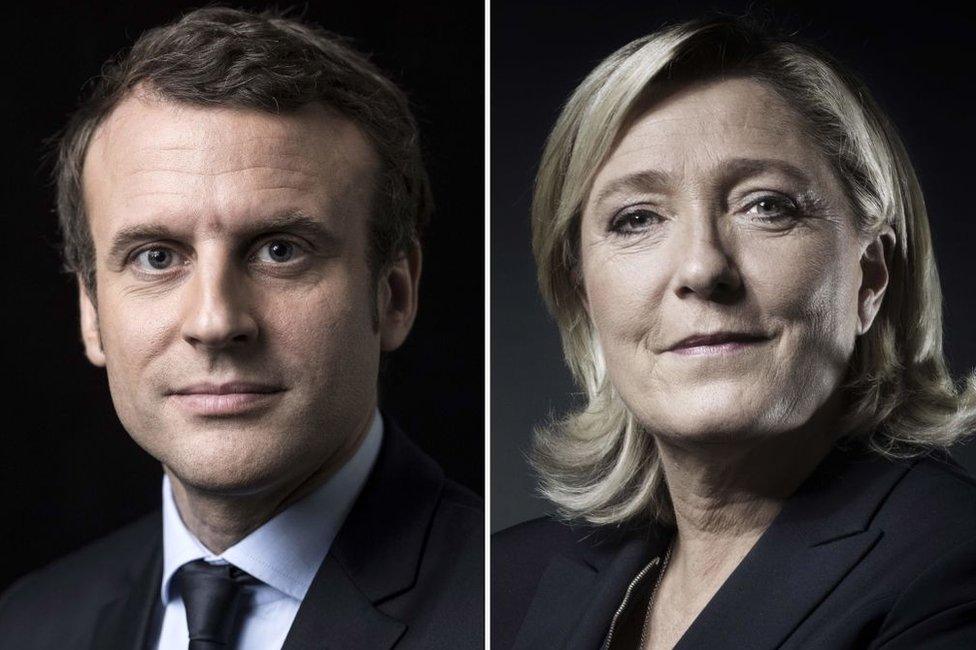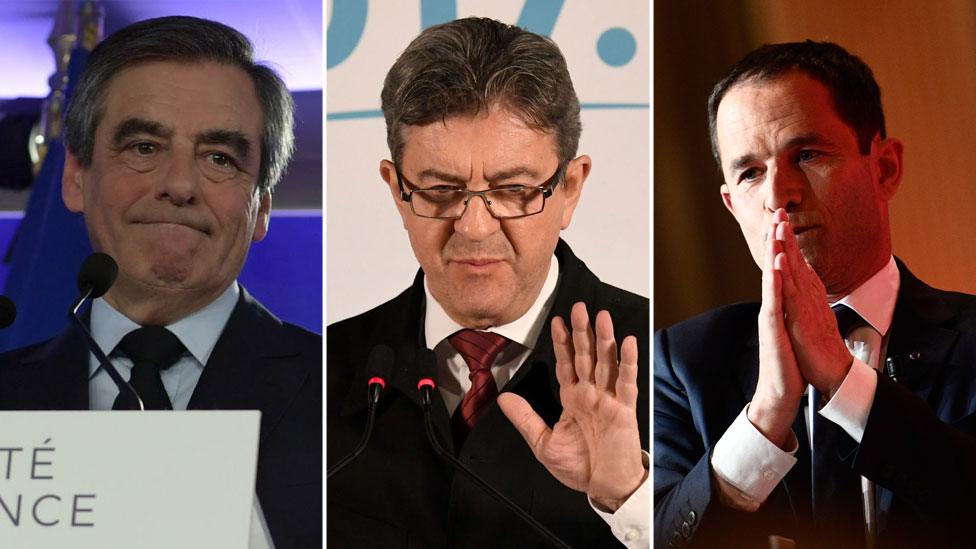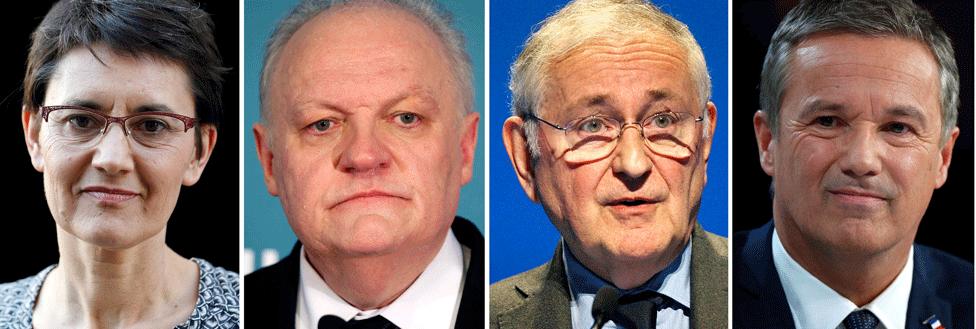French election 2017: Who are the final candidates?
- Published

The two now battling to become French president - Emmanuel Macron and Marine Le Pen - have sharply contrasting visions for France's future.
Mr Macron, a liberal centrist, took 23.75% of votes in the first round on 23 April, ahead of the nationalist Ms Le Pen on 21.53%.
Eleven candidates were in the running. The election was historic for France, because the top two defeated the ruling Socialists and centre-right opposition Republicans. Those parties have dominated French politics for decades.
Ms Le Pen's result was the best yet for her National Front (FN), once a pariah party tarnished by accusations of anti-Semitism.
But Mr Macron, with his non-party political movement En Marche (On the Move), is the firm favourite for the run-off on 7 May. He already has pledges of support from the Socialists and Republicans.

Marine Le Pen

She took over the FN leadership from her father in January 2011 and came third in presidential elections the following year. She brought the party big electoral gains in regional elections in late 2015.
Despite her efforts to soften the FN's image, and reach a wider electorate, opinion polls suggest she is unlikely to defeat Mr Macron.
In 2010, before being elected leader, she compared Muslims praying in the street to the Nazi German occupation.
As the election approached she told voters she would suspend all legal immigration. She also caused outrage by wrongly suggesting that France had no responsibility for the Paris round-up of 13,000 Jews deported in World War Two.
In depth: Is France's National Front leader far-right?
Ms Le Pen, 48, trained as a lawyer and formerly headed the FN's legal department. She was elected to the European Parliament in 2004 and remains an MEP, representing North-West France.
She is twice divorced with three children, and lives in the western suburbs of Paris.
What she wants:
Abandon the euro (and return to the franc), renegotiate France's EU membership, then hold a referendum
"Automatic" expulsion of illegal immigrants and cut legal immigration to 10,000 per year
"Extremist" mosques closed and priority to French nationals in social housing
Lower retirement age to 60 and 35-hour week assured
Ban wearing of "ostentatious" religious symbols such as Muslim headscarves and veils in public
Impose a 35% tax on goods from firms that relocate out of France

Emmanuel Macron

At 39, he has a real chance of becoming France's youngest-ever president.
He is not an MP and has never stood for election before, but his political rise has been meteoric.
A former investment banker, Mr Macron worked as economic adviser to President François Hollande - a Socialist - before taking up the post of economy minister in 2014.
His "Macron Law" was a controversial reform bill that allowed shops to open more often on Sundays and deregulated some sectors of industry. He also championed digital start-ups, but his policies drew opposition from the most left-wing Socialists.
He launched En Marche as "neither left nor right" in April 2016, and resigned from the government before launching a presidential bid.
Among his supporters are veteran moderate François Bayrou and Socialist ex-Prime Minister Manuel Valls.
Mr Macron is married to his former French teacher Brigitte Trogneux, 20 years his senior, and has seven step-grandchildren.
What he wants:
Unify France's complex pension system, made up of 35 different public schemes
Cut 120,000 public-sector jobs and bring down the budget deficit
Slash corporation tax from 33% to 25% and let companies renegotiate 35-hour week
Send more teachers to deprived areas, ban mobile phone use in schools for under-15s
Strengthen EU ties, and tighten integration between eurozone countries
€50bn (£43bn; $53bn) public investment plan to cover job-training and shift to renewable energy

What about the other candidates?
Two candidates - the conservative ex-Prime Minister François Fillon and the radical leftist Jean-Luc Mélenchon - were not far behind Mr Macron and Ms Le Pen.
Mr Fillon, 62, had been an early favourite, beating heavyweights Nicolas Sarkozy and Alain Juppé for the Republican candidacy. But his campaign was rocked by allegations that his wife and two children improperly received public funds. Initially he said he would step aside if he was placed under formal investigation, but never did.

From L-R: Francois Fillon, Jean-Luc Mélenchon, and Benoit Hamon
Far-left firebrand Mr Mélenchon, 65, seized on the Socialist party's meltdown to become one of the four frontrunners. He seized the limelight with his razor-sharp wit during televised debates and impressed the public with his hi-tech use of holograms, projecting his image to rallies in six cities simultaneously.
Benoit Hamon, 49, was the Socialist Party's candidate. He is a left-wing rebel within the mainstream, who took the party's candidacy away from a former prime minister.

From L-R: Nathalie Arthaud, François Asselineau, Jacques Cheminade and Nicolas Dupont-Aignan
Nathalie Arthaud, Lutte Ouvrière (Workers' Struggle), 46, Trotskyist: Sought to freeze job cuts, boost salaries and pensions, impose worker control on enterprises and ownership of means of production.
François Asselineau, Union Populaire Républicaine (Popular Republic Union), 59, Nationalist and anti-US: wanted withdrawal of France from the EU, euro and Nato, to renationalise big industries and private corporations.
Jacques Cheminade, 75, ex-civil servant in economy ministry sought to ditch the EU and abandon the euro. A follower of US conspiracy theorist Lyndon LaRouche.
Nicolas Dupont-Aignan, Debout La France (Stand Up France), 55, Gaullist: wanted to leave the euro and scrap the EU, higher ethical standards for elected officials, focus on the fight against jihadist terrorism. Claims he received texts from the Fillon campaign urging him to withdraw his candidacy.
Jean Lassalle, 61, centrist, independent MP who wanted to renegotiate European treaties; staged a 39-day hunger strike in 2006 in a bid to save 140 jobs at a factory and walked 5,000km across France in 2013. Hailed for his "refreshing" bursts of rhetorical frankness, as when he coarsely dismissed the value of opinion polls, external.
Philippe Poutou, 50, New Anti-Capitalist PartyFord factory worker who wanted to lower retirement age to 60, reducing the working week to 32 hours and make abortion and contraception free and accessible. Many hailed him the star of the second presidential TV debate when he attacked Mr Fillon and Ms Le Pen over allegations of corruption.